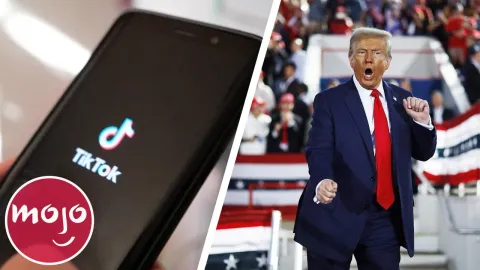Tik Tok Ban: Explained!

Who Proposed the Ban?
Owned by Chinese tech company ByteDance, the ubiquitous social network TikTok was met with a negative reception in 2020 by then-president Donald Trump. Trump’s successor, Joe Biden, seemingly agreed with Trump (hey, there’s a first time for everything). Biden signed the No TikTok on Government Devices Act at the end of 2022, calling on ByteDance to sell TikTok to a U.S. firm, or be banned entirely. Subsequently, the U.S. House of Representatives passed the bipartisan Protecting Americans from Foreign Adversary Controlled Applications Act in 2024, explicitly putting pressure on ByteDance to sell the platform by Jan 19, 2025. Curiously, Trump has since reversed his position, asking the Department of Justice for more time to negotiate a political solution before he retakes office.
Data Privacy Concerns
So, why is the U.S. government so worried about an app that most of us use for watching cat videos? Politicians fear that, because TikTok is owned by a Beijing-based parent company, it could serve as an efficient pipeline to illicitly send American users’ data to the Chinese government. In addition, the government has expressed concern about the potential for Chinese disinformation campaigns to gain traction via TikTok, and potentially using that traction to commit election interference on American soil. Said Democratic Senator Mark Warner of Virginia, “It's not hard to imagine how a platform that facilitates so much commerce, political discourse and social debate could be covertly manipulated to serve the goals of an authoritarian regime.” As such, the act that President Biden signed into law would target places that TikTok can be downloaded from, like the Apple App Store and Google Play — these corporations could face heavy fines if the government feels that they aren’t playing ball.
User Safety vs. Freedom of Speech
Meanwhile, TikTok has hardly been silent in fighting back against what it claims is the tyranny of the American government. Michael Hughes, a TikTok spokesman, said in a statement that the government’s efforts to ban the social media platform constituted an attack on the free speech of U.S. citizens. Noel Francisco, a lawyer for TikTok, argued that the law zeroed in on “the speech itself — this fear that Americans, even if fully informed, could be persuaded by Chinese misinformation. That, however, is a decision that the First Amendment leaves to the people.” However, Supreme Court associate justice Elena Kagan argued that the law only applies to ByteDance itself, “which doesn’t have First Amendment rights.” Francisco warned that, if the ban is allowed to go through, “the government really could come in and say, 'I'm going to shut down TikTok because it's too pro-Republican or too pro-Democrat, or won't disseminate the speech I want, and that would get no First Amendment scrutiny by anybody.”
What Will Happen on January 20th?
As we mentioned a bit earlier, ByteDance has until January 19th to fully divest from TikTok and sell it off to an American company. Of course, based on all available information, this is highly unlikely to actually happen, and TikTok’s best chance of remaining active in the U.S. is if incoming president Donald Trump rushes to its aid. So, let’s say the worst case scenario occurs and TikTok is barred from operating in the United States. There are a few possibilities as to what happens next. Like we said, the specific wording of the act banning TikTok would require that the app be removed from digital marketplaces, meaning that new users would be unable to download it. Well, what about everybody who already has it? While it seems unlikely that the app would simply “go dark” at midnight on the 20th (like what happened when India banned it in 2020), TikTok would likely become buggy, glitchy, and just generally difficult to use.
What Are the Influencers to Do?
Of course, as with any hot-button issue, there are multiple sides to the “to ban or not to ban” conversation. On one hand, parents of children and teenagers have expressed support for the ban, citing their concerns about the types of content that young people are exposed to, as well as the negative effects of overuse. On the other hand, it’s important to remember that we’re in a new age of uncharted digital territory. There are people who’ve been able to use TikTok as a career starter. Said CNN based on a TikTok estimate, “7 million US small businesses that use the app stand to lose $1 billion in revenue, and around 2 million creators would suffer $300 million in lost earnings in just one month, if the app is banned.” Creator Eli Rallo voiced her worries about what would happen if TikTok went away, saying that “I think we would see an uptick in deals on Instagram, but the TikTok money is definitely the bulk of my income.”
What Happens Next?
Jess Maddox, assistant professor at the University of Alabama, warned that enacting a ban on TikTok could have harmful ripple effects. Maddox pointed out that, while a small handful of influencers have been able to mine extreme wealth from the platform, “the reality is the people who are going to be most hurt by a TikTok ban are those staunchly middle-class Americans who are using this for information, for entertainment, to grow their business, their following, and grow their community.” With the Supreme Court increasingly leaning in favor of a ban, the app’s sole hope ironically appears to be President Trump. However, given that the ban is set to take effect on Jan. 19th, one day before his inauguration, even the Commander-in-Chief’s hands are tied. If TikTok influencers’ worst fears come to pass, then a mass migration from TikTok to other platforms, like Instagram and YouTube, seems like an inevitability.
What do you think will happen to TikTok? Would you be sad to see it go? Be sure to let us know in the comments below!
